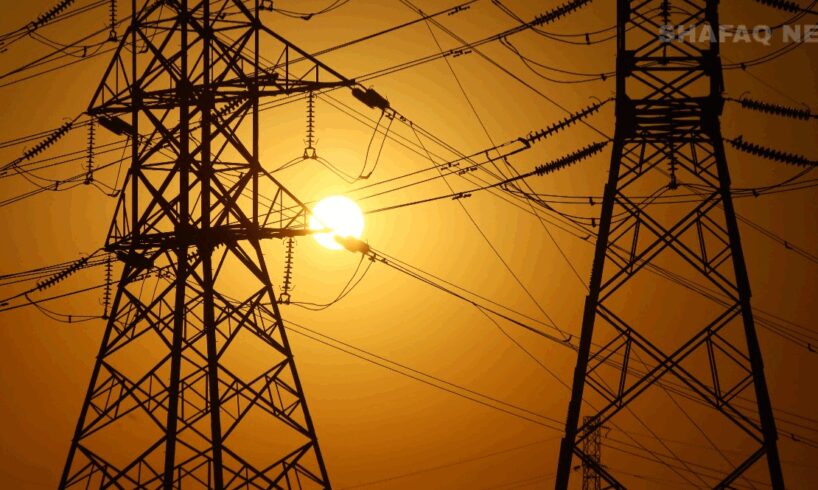
Shafaq News
Just as Iraq seemed close to easing its severe electricity shortages, a US hidden veto derailed the plan, leaving millions still facing blackouts and exposing how energy has become a battleground for global influence.
Baghdad had been preparing to import five billion cubic meters of Turkmen gas annually via Iran—a deal that could have powered major stations and reduced outages that now last more than twenty hours a day in some provinces. But Washington’s sudden objection, even if not officially announced, halted the project, turning hope into crisis and showing that Iraq’s energy problem is no longer just technical or economic—it is deeply political.
The suspension was not unexpected. Iran was set to keep up to 23% of the daily supply for domestic use, a share Washington deemed an unacceptable advantage. Had the deal gone through, it would have replaced roughly one-third of Iraq’s current gas and electricity imports from Iran, giving Baghdad a rare chance to diversify.
Instead, the agreement became another geopolitical card in the hands of larger powers.
Baghdad tried to ease concerns by proposing international oversight, but Washington’s rejection exposed Iraq’s fragile energy security. For the US, this is about more than sanctions—it is, according to sources, about stopping Iran from becoming a Central Asian gas corridor and preserving American leverage in the region.
The sources also point to other motives: protecting allies like Qatar, countering China’s Belt and Road projects, and keeping Iraq dependent on US-approved exemptions.
Speaking to Shafaq News, energy expert Hamza Al-Jawahiri explained that the suspension was expected, since transporting gas through Iran would have allowed Tehran to take a share without direct payment—a red line for Washington. The deeper problem, however, is Iraq’s lack of alternatives, leaving it exposed whenever political or regional obstacles appear.
Had the Turkmen gas reached Iraq, it could have powered several major stations and eased the summer load. At the same time, Iraq wastes over 16 billion cubic meters of gas annually through flaring—enough to supply half of its electricity needs.
Yet bureaucracy and delays keep these projects from moving forward, while electricity demand continues to grow at 7–10% each year.
“Washington understands this weakness and uses it as pressure,” Al-Jawahiri noted, stressing that every delay in exemptions or blocked deals translates directly into public anger and political instability.
Member of Parliament Intisar Al-Jazairi, of the Al-Siyada Alliance, stressed that Iraq’s electricity crisis has outgrown its technical roots. “Every new energy agreement is now subject to US approval,” she explained, adding that the Turkmen deal had offered a strategic chance to gradually reduce Iraq’s reliance on Tehran.
International economics Professor Nawar Al-Saadi described Washington’s veto as part of a wider geopolitical effort to block Iran’s rise as a Central Asian gas corridor, stressing that Iraq imports nearly a third of its gas and electricity from Iran, and any disruption immediately hits millions of households and shakes economic stability.
Looking ahead, Al-Saadi argued that Iraq must secure partnerships with stable economies to guarantee long-term supplies. “Options include capturing flared gas and importing LNG from Qatar or Oman,” he explained. “These choices are more costly, but they insulate Iraq from sanctions and reduce its vulnerability to Iran.”
He added that Washington favors this strategy, since it steers Iraq toward LNG markets controlled by US allies while discouraging routes tied to Tehran.
“The veto also sends a message to Turkmenistan and other Central Asian states: cooperating with Iran carries political costs,” Al-Saadi concluded, noting the broader impact this could have on regional energy dynamics.
Meanwhile, economic expert Mustafa Al-Faraj proposed a one-year US exemption allowing Iraq to import gas under international supervision, ensuring Tehran does not benefit directly. Such a move, he argued, could give Baghdad space to advance domestic projects, modernize infrastructure, and stabilize electricity supply.
But he warned that temporary fixes are no longer enough. “The crisis is now structural, weighing on both the economy and social stability. Without urgent reform, the system risks wider collapse,” Al-Faraj cautioned, suggesting Iraq may eventually turn to Russia or China—decisions that could reshape its long-term relationship with Washington.
Each suspension highlights more than a technical delay; it exposes Iraq’s place in a wider contest of influence. For Washington, energy contracts are political tools. For Iraq, the real challenge is to move beyond seasonal fixes and build genuine capacity—capturing flared gas, diversifying partners, and repositioning itself in the regional energy map.





